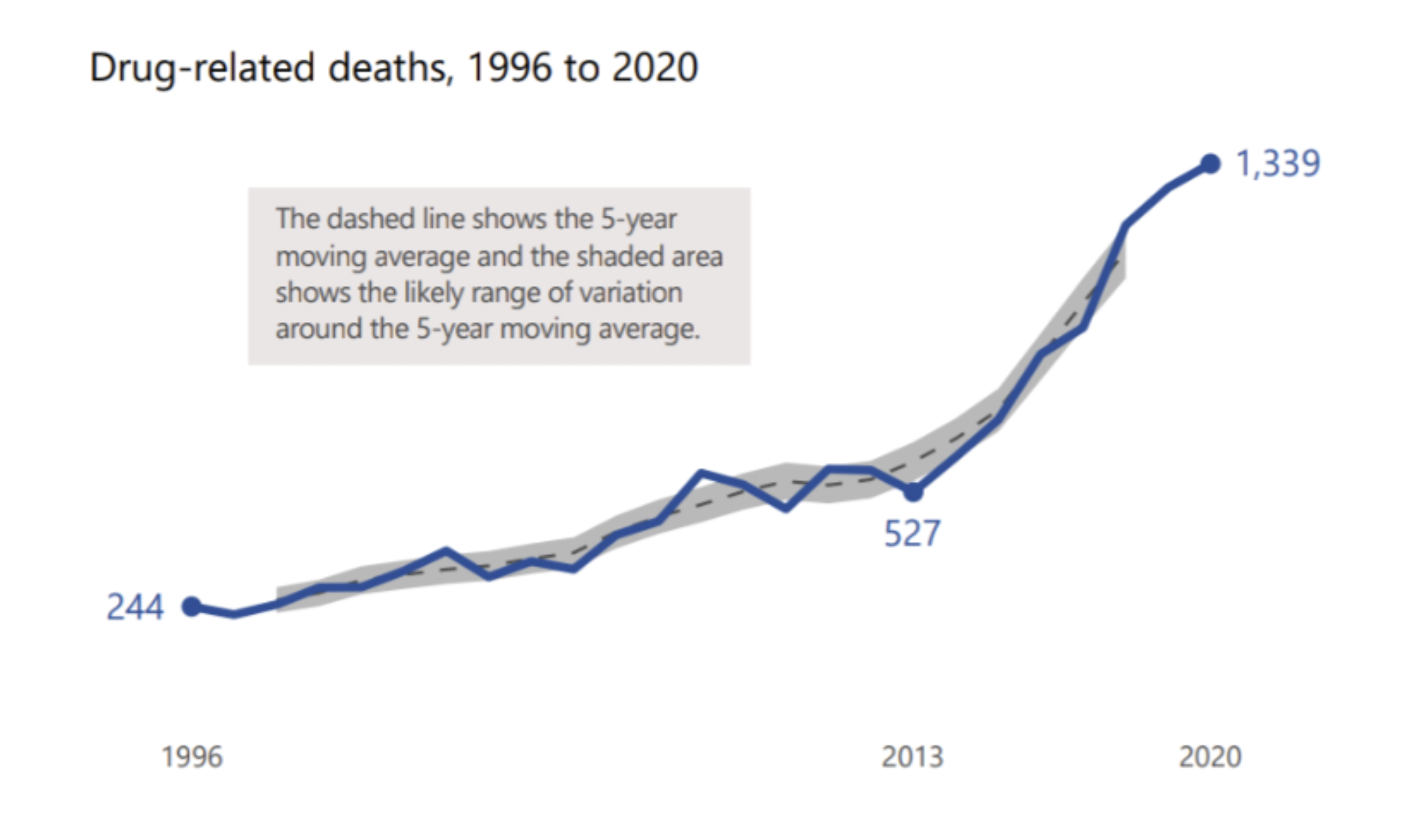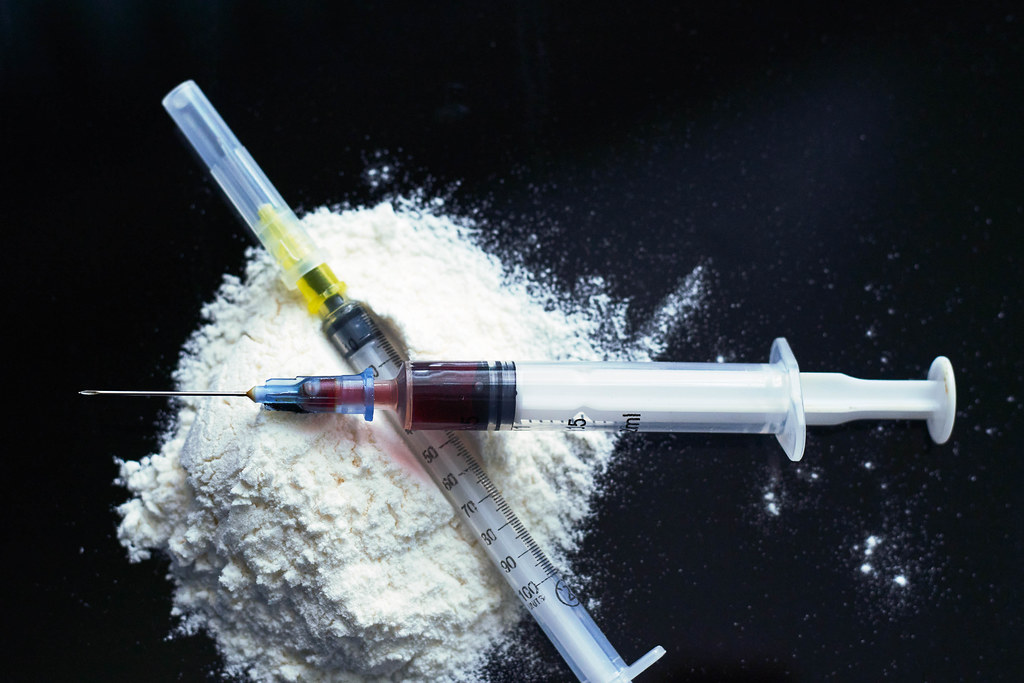
Figures released yesterday paint a bleak picture. 1339 people died as a result of drug misuse in Scotland in 2020, an increase of 75 from the previous year, marking a seventh consecutive year of record deaths. The number of deaths has increased almost 300% in the last decade, with many arguing the crisis is out of control.
Scotland’s drug related deaths are over 3x higher than any other country in Europe, and over 3.5x that of England and Wales.
It is also crucial to highlight that these figures, bad enough as they are, do not include: deaths that are due to accidents while intoxicated; deaths from blood-borne viruses; deaths indirectly related to drug use, such as infections or subsequent complications; deaths involving volatile substances.
The Greater Glasgow area had the highest number of deaths per capita, just over 30.8 deaths per 100,000 people. Unsurprisingly, those living in the most deprived parts of the country were much more likely to suffer from a drug-related death, however, yesterday’s figures show that the situation is worsening. In 2020, those living in the most deprived areas are 18x more likely to die in a drug related incident than those in the least deprived areas. At the turn of the century, this figure stood at 10x.
Polydrug use is a key contributor to most of these deaths, with drug users mixing prescription and non-prescription drugs, often with alcohol on top, with unknown substances mixed into street narcotics. The rise of street valium, coupled with residually high levels of heroin and other opioid use, together have contributed to many of these deaths. In 93% of all drug-related deaths, more than one drug was found to be present in the body.
However, polydrug use alone cannot explain the tragedy that these deaths represent. Nor does it indicate why so many in Scotland feel the need to resort to these exceedingly high levels of drug use which have taken the lives of more than three people a day, every day, for the last year and more.
Communities have been destroyed by years of neglect, and while Scotland has evolved, from the industrial age, the scars of this process remain. Across Scotland, deindustrialisation has plagued working class communities with poverty. The resultant trauma has deeply impacted upon people’s lives, becoming intergenerational. In turn, Scotland’s drug use has become intergenerational, and as poverty worsens, so too have the number of drug deaths increased.
The Scottish Government have invested millions of pounds in a variety of different schemes to combat these deaths, but ultimately, the impact of this multigenerational poverty as a result of Thatcher’s policy of deliberate deindustrialisation, will not be reversed overnight. However, the marked increase in deaths while the SNP have been in power, clearly show that they are getting something wrong. Moreover, areas in the North of England experience similar levels of poverty, and faced even harsher processes of deindustrialisation, so these phenomena alone cannot explain this crisis.

Addiction services remain chronically underfunded across Scotland, with rural areas in particular struggling to access facilities. Cuts to local authority services have ravaged the sector leaving the most vulnerable unable to access crucial services. These are the real effects of the SNP’s continuing campaign for increased centralisation at Holyrood, at the expense of local authorities.
Nonetheless, the Scottish Government’s recent interventions, promoting the use of lifesaving Naloxone, which reverses the effects of an Opioid overdose, are welcome. So too is increased funding for rehab services, and the shift from annual, to quarterly statistic reporting will allow for greater attention to detail when it comes to drug related deaths.
But these attempts to tackle the symptoms rather than the root of the issue, will not solve this crisis alone. Capitalism continues to alienate vast swathes of our communities. Moreover, it systematically seeks to exclude those it deems worthless, if they are not economically active. This alienation, intertwined with poverty and deprivation, are ultimately the root cause of this crisis, forcing individuals to turn to drugs to escape the monotony of daily life. In turn criminalised, drug users only become more and more alienated from the rest of society.
This criminalisation is another key factor which puts Scotland ahead of many other European nations with more relaxed drug legislation. The criminal justice system is entirely unable to deal with the plethora of issues that we currently face related to drug use. The current system, which seeks to criminalise drug users is not fit for purpose, and only alienates drug users further, putting them at increased risk of addiction and potential overdose.
Each and every one of these deaths represents a tragedy for the family and friends who have lost a loved one. We desperately need increased funding for addiction services across Scotland. A shift away from the current system which alienates and criminalises drug users, without understanding the reasons for drug consumption, is crucial if we are to tackle this swelling crisis. Moreover, the warm words from politicians from across the political spectrum are worthless, if they are not backed up with a root and branch overhaul of the systems which plague our society and those alienated from it. We need fully funded services, and we need them now.
Peter Stoddart
You can read the full report, published by National Records Scotland here: https://www.nrscotland.gov.uk/files//statistics/drug-related-deaths/20/drug-related-deaths-20-pub.pdf



